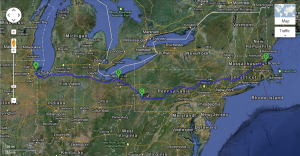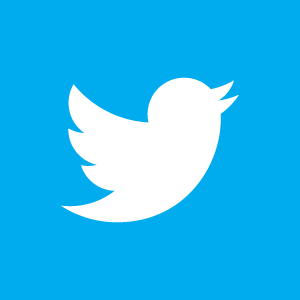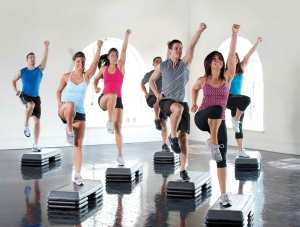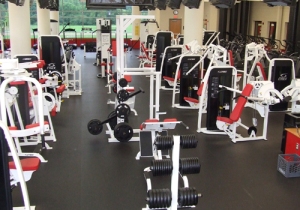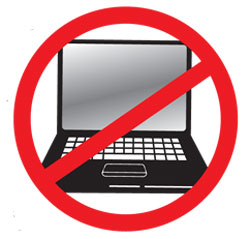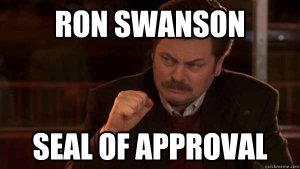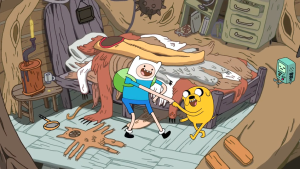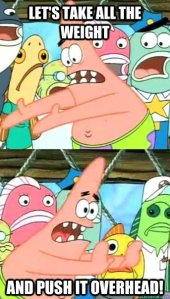Making the First Move
When I was in high school, I was pretty much a douchebag. During my first three years, I was excruciatingly arrogant and judgmental. I associated with a few people as smart and self-absorbed as myself and a select few others who’d demonstrated their worth over a long vetting period. That’s the level of douchebaggery we’re talking about here; I was judging the worth of other human beings at the wizened age of 14. If it wasn’t already abundantly clear, I had only a handful of friends and in hindsight I’m positive that it’s due to my being an insufferable tool.
Then during my senior year I had this weird moment of clarity where I realized that I wasn’t just “not popular due to circumstance”, but “unpopular due to my nature.” It wasn’t a good feeling, but it was in an odd period of a few weeks where I had my first serious bit of introspection and decided to make a change. I started watching what the “popular kids” did and trying to figure out the difference between them and I. I drew graphs (no, seriously) and diagrams to try and figure out the power dynamics in play; I went to a few of my more popular friends to get their opinions.
One of the first realizations I had was that they were generally more concerned with being clever and funny than they were about being factually accurate. But being funny didn’t come naturally. My whole conversational strategy at that point was being a smug asshole who pointed out factual errors. It took a long time for me to figure out how to be funny; initially I was decidedly unamusing, but eventually I learned just a modicum of comedic timing, and I think I’ve done much better since.
Another thing I figured out was that I needed to ignore peoples’ shortcomings when it wasn’t relevant. Before this, I’d make judgements and if the negatives started to outweigh the positives, I’d write the person off (again, I was a truly arrogant prick) and view them as antagonists for the forseeable future. If I were to begin the healing process, it’d be only after accepting people’s foibles as well as their virtues. Nobody is perfect, and most people aren’t even close (myself included,) but that shouldn’t keep you from having some good conversations with them.
Lastly, but not *most* importantly, I realized that I had to start putting myself out there. I remember that I started attending events I’d previously shown no interest in whatsoever. Sporting events, dances, whatever. It was a numbers game, and I’d refused to play until that point, earning myself a substantive number of zeroes.
Gradually, I did get better. I got funnier (but not before botching the delivery of hundreds if not thousands of jokes.) I became way more accepting. If you’d told high school me that I’d count democrats and LGBTs and atheists and people who I still don’t have an even remotely accurate shorthand label for amongst my best friends and that none of our differences would matter at 1AM at a booth in The Tombs, past me would have written off present me almost as surely as he wrote off sports. I even got to the point where I was dateable (if only just!) Crazy, right?
College made me socially lazy. The first two years I had some pretty standard existential crises and scholastic trials. I had a job I hated and eventually quit. Made friends and watched as the group imploded shortly thereafter. Dated a lovely girl and broke up with her when school started kicking my ass. You know, pretty usual underclassman stuff. By junior year I was having a really rough time. I didn’t have many friends because my program was tiny, so I never met people. My roommate helped me out of that by getting me into theater, and by senior year, I was doing okay again. Even after a pretty mediocre 3 years, I was still able to meet a ton of new people pretty easily senior year. I still needed to be funny and ignoring people’s percieved shortcomings, but I’d long since internalized those. What I DIDN’T need to do was go to events I wouldn’t have otherwise; it was a bigger population sample, and I could afford to be selective about which events I participated in. And as a result, I sorta stopped. It wasn’t necessary, so I just got out of the habit.
Annnnnnnd then I graduated and moved clear across the US. I knew maybe 4 people who were planning on being out there. I met a few new people in Seattle, but way fewer than in college and probably even fewer than I did senior year of high school. And then, to make matters worse, I did the same damn thing and moved to Boston, where it turns out I somehow know all of 2 permanent residents. So now I’m sitting around alternating between writing blog posts/drinking whiskey (sue me, Hemmingway really had creativity down, even if he could’ve cut his word counts down by a solid 30% for each book) and Crossfit (sue me, the membership is expensive and I *really* want to get a muscle up this month.) So what the hell happened?
Well, I stopped being proactive; making the first move. Sitting in the apartment isn’t going to help me meet anyone. Frankly, neither will sitting at a bar somewhere or walking around if I’m rocking headphones or sitting there grimacing. I know I can’t take everything into my own hands (what a pity) but I can at least put myself in a more statistically favorable position.
Buuuuttttt, it’s already pretty late for a Sunday and I’ve got some chicken in the oven. Maybe tomorrow. Still; making the first move is gonna have to be a priority for me in the coming weeks, both at work and at Crossfit and in my general social scene. Wish me luck, kids!
Intangibles
So I mentioned in an earlier post that I had to leave my beloved Xplore Crossfit (due to it being a couple thousand miles out of the way) and have since signed up at Crossfit Fenway.
The programming is pretty different. Jordan always had a really heavy involvement in a given workout. He’d write the programming and then observe the classes over the day, tweaking it and occasionally rewriting the entire thing on the spot. The result was that it’d always be appropriately brutal; if he wasn’t seeing the target number of rounds in an AMRAP, he’d flip the script on it until a class got it right. Luckily for me, Jordan also put a heavy emphasis on strength on most days, focusing on short, heavy exertion on Wednesdays and moderate length, moderate output on Fridays. The rest of the time was spent doing drilling our lifts. As a result, I definitely gravitate towards more of a strength-based preference (think of strongman events as an example; really heavy stuff for comparably short periods.) My CFT is pretty good for my weight, but my benchmarks are almost uniformly crap.
I’ve been considering that maybe I don’t like Crossfit; I’m, by most accounts, decidedly sub-par at it. I hate wall balls. And thrusters. And double-unders. And sumo-deadlift high pulls. And kipping pull-ups. And anything involving a handstand. Frankly, I don’t even care that much for snatches (though it might have something to do with the shoulder issues that tend to get exacerbated by full snatches.) My endurance is crap. The only things I like are deadlifts and squats and presses; if that’s the case, why do I still follow Crossfit programming? Wouldn’t a strongman or powerlifting or even just a strength program be closer to what I’m looking for anyway?
Well, not quite. Because while the actual lifts I enjoy are firmly in the minority, there are a few intangible benefits to a CF program that you either won’t find or have to look really hard for in other programs. All CF classes are group events. Turns out that I absolutely suck at self-motivation and the presence of others helps me to get stuff done at a higher intensity. I log my stuff on Fitocracy. Sometimes I’ll look back to see the trend of my lifts. Almost every time there’s a major dip in performance for a day, cross referencing my notepad shows that those are the workouts where I’m just doing my own thing. It has become pretty clear that I’m not gonna get awesome by myself. I need to be surrounded by similarly awesome people and THEN I can get it proverbially poppin’.
Similarly, there’s a heavy emphasis on recordkeeping and improvement that’s also been a big part of every CF box I’ve ever been at. Jordan was famously insistent that you keep good records; the best case was that he’d chew you out, oftentimes you’d have some burpees to do for your transgression. In any event, everything goes on the board and stays for the rest of the week. It wasn’t so bad initially, but at this point in my athletic development, some of the times I post are embarrassing, and I want to stop that as soon as possible.
Lastly, due to the fact that there are so many different skillsets in play within Crossfit programming, athletes are encouraged to deal with their goats (goats are skills you “just plain suck at.“) You get that sort of thing in strongman programs because they too deal with a pretty varied skillset, but it’s conspicuously absent from many general strength programs. Look, NOBODY is saying anything bad about Wendler 5/3/1 or Westside. What I am saying is that they are extremely effective programs designed around extremely narrow, clear-cut goals. Anything that takes from a powerlifting background is gonna feature lifts which are exclusively in the service of improving the Big Three. Anything from an Oly background is gonna serve your C&Js and Snatches well, but probably won’t help you bench. CF as a general physical preparedness program must necessarily eschew that mechanism of design, and that’s a really good thing for me. Because as much as I definitely want to just squat, deadlift and press, it wouldn’t help me with the hundreds of pull ups or wall balls or double unders I’m gonna have to do at some point. Every brutal chipper where I take 5 minutes more than the other athletes to finish is just a reminder that the goats are the things I really need to dial in on before I can be well-rounded.
I don’t expect to be an expert in any given area thanks to CF training, but I like the idea that CF can get me a solid 75% of the way to being good at a lot of things. I like that you make friends at CF. I like that I can (and do!) plot my numbers and see a positive trend. Crossfit isn’t program I’d do best at. That’s pretty apparent; There’s too much jumping rope and too much rowing for that to ever be the case. But it is a program that’ll make me the most awesome in the greatest number of different ways and it isn’t just the lifts that’ll do it – it’s those intangibles.
Just when you thought it was safe, Dan!
I’m back! Apologies for the hiatus; the vast majority of my time has been spent traveling across the country and battling U-Haul, who refuse to fork over the goods contained in the U-Box I ordered (which you might recognize as being *my* goods.) Seriously, fuck those guys; just the worst service.
But even if my swag isn’t here with me in Beantown, my trademark Dan-swagger certainly is. I’ve moved into temporary housing which lasts until the end of August, about 3/4 of a mile southeast of Fenway Park. The apartment is gigantic, but its weird because its a sublet. The girl who lives here left it decorated since she’ll be back in 3 months to continue living here. Makes perfect sense, but it makes me feel like I’m squatting in some chick’s apartment when, in fact, I’ve paid for the services rendered. Wouldn’t be so bad, but there are a lot of family pics around the house. Just a tad unsettling, in my humblest opinion, but c’est la vie. The area is awesome. I’m basically in the off campus housing for one of the approximately 4 colleges/conservatories within extremely short walking distance and I’m a literal walk in the park from my new home at Crossfit Fenway. Its nice to be around people my age again, which I didn’t get at Microsoft or downtown in Seattle. Obviously most people are probably between 0 and 5 years younger than me, but it’s still way closer than hanging out with a bunch of kids who have their own kids, ya know?
My travels took me through Chicago, Cleveland and Pittsburgh to visit my grandmother, siblings and friends, respectively. Chicago was rough; my grandmother doesn’t have internet in her house, so it was pretty damned dull/impossible to coordinate the other aspects of the move without leaving the house. We were only there for a few days, but thanks to U-Haul’s legendary incompetence, it was a time of undue stress for me.
Cleveland would have been a lot more fun if I’d been even remotely prepared for the weather. I guess I underestimated the need for cold weather gear in freaking May. The first day we were helping my sister move from one dorm to another in the frigid rain, but we turned it around over the next two days. The weather got marginally better (still nothing I’d prepped for) and I got to hang out with my brother and sister a little. Would’ve been better, but there isn’t anything to do in Cleveland except eat/drink and wait for the next time you get to do so. I did manage to drop into Crossfit CLE, which was nice. I’d been out of the gym for a few days at that point, so I wasn’t expecting great things. I can say in retrospect that non-great things were handily delivered. We also went to a bar called Melt (at my brother’s insistence.) The portions are disgustingly larger, but the food isn’t bad, and I actually liked the atmosphere (it was like the Tombs, albeit with a dumber food menu and a bunch more plaid and horn-rimmed glasses.)
Pittsburgh was fun. I got to see the incomparable Shawn and Becca, which is always delightful. Most of the day was spent showing me around town. Some highlights of the day were visiting Wigle Whiskey, a tiny little whiskey distillery on the water that does (highly recommended) tasting flights and a few choice cocktails at their Strip District distillery, the Hofbrauhaus, because why aren’t there more places that’ll serve a liter of beer (I like the way the Germans think…,) and Winghart’s, which was an alright seeming bar, but the neckbeard bartender put on some old Dr. Who which was great fodder for crackin’ wise at. I’m bummed that I didn’t have more time to stay, but now that I’m on the east coast, visiting should be eminently more achievable.
Anyway, the travel portion of my move is done; now it’s just a matter of getting all my stuff, learning the area and getting my affairs in order. Stay tuned for more updates as I explore (read: get lost in) the great city of Boston!
My Adult Life – Advice and Cautionary Tales for the Recently Graduated
It’s been just under a year since starting at Microsoft. Being employed in my field and debt-free means that I’m a fair sight more fortunate than many of my peers, but it didn’t keep me from learning a thing or two about dealing with stuff as an adult/young professional with few contacts. Here are some of the things I wish I’d known before graduating:
- Meeting new people outside of work is hard. Seriously, if you’re reading this and haven’t graduated and are sitting there thinking “Well, chyeah, for you, but not me! I’m a brilliant social butterfly. Everyone loves me and my magnetic personality will keep my social life vibrant and exciting!” WRONG. College has a couple extremely favorable properties for students to make friends. The first is the fact that everyone is within 4ish years of each other in age. In the “real world” everyone is random ages. The best you’ll get in terms of a hint is whether or not they’re in a job position which requires a degree (which implies they’re at least 21/22) or you see them in a bar (same implication.) Just being the same age and in college usually implies that you’re at *roughly* the same stage of life too. Obviously there are exceptions, but few of my college classmates had 401(k)s or spouses or mortgages which demanded their time and attention. Maybe you’re like me and have to work with people before people are your friend (because, like me, you have terrible first impression skills.) Well, that sucks, cuz it’s gonna be even more work for you. I no longer go to bars without people I know, since my success rate is basically zero. The good news is that any free time you have can be used for stuff you enjoy doing. I’ve met more acquaintances through Crossfit than I have at work or bars. I suggest finding something that’ll better yourself and doing that; as long as it isn’t a solitary effort, you’re bound to make at least a casual human connection. If it seems like you’re not finding anyone like you, don’t take it personally; it really is a question of population density and self-selection.
- No one makes you do anything and you’ll need to really decide what you want in the long term. When I got to Seattle, they had me in a swanky apt on Mercer Island for a month. It was the first time I had any sort of cash flow in a while and there wasn’t much to do on that island without a car. I could’ve done a lot of things to better myself. I probably could’ve regained most of the Russian I’d lost, or started studying for something or working out more or writing more. But I had cable, and the CVS across the street started carrying liquor and there was a Zaw really nearby, so most of my weekends were spent with a bottle of whiskey, a Pawn Stars episode I’d already seen and a whole pizza. Remember in college how when your parents weren’t around and you realized you could skip class since the professors didn’t care? And you had to figure out your own motivator and use it? Well, get ready to do that again. Unlike in college where at the very least you had a roommate or friends who would complain if you were lame and wanted to sit around with a case of cheap beer and chain-watch Arrested Development for the 13th time, you can now afford to buy midrange beer and do so and nobody will say a damned thing about it! Eventually, I had a medical episode that required me to do better nutritionally (eat better, drink less, sleep more), which ended up being the impetus that got me writing and working out again. Not everyone will be that “lucky”, but the trick is to have something lined up. Don’t come in cold with nothing to do. Keep up the work capacity you had in college. Find something you couldn’t do for want of time or funds and fucking start. Because if you don’t, well, there isn’t really anything that’ll make you.
- On that note, medical bills are comically, absurdly, stupidly expensive the second you have anything more than a basic doctor’s appointment. I needed a bunch of diagnostic work and it cost a crap-load, even with the bitchin’ insurance MS provides. Do yourself a favor and keep yourself in reasonable shape. You don’t have to be an athlete (though obviously I’m in favor of being one if possible!) or buy organic or anything, but limit yourself to a reasonable number of drinks per week and eat an amount of food appropriate for your weight. It’ll be way cheaper in the long run.
- Arrange to have your bed at your new apartment the first day of your lease if the place doesn’t come with it. Sleeping on your floor is not comfortable and definitely not what you want to deal with the first night of a move. On a similar note, get your furniture locally. Craigs list, IKEA, your apt complex’s classifieds, whatever. While getting stuff on the internet is trivially easy, shipping is terribly expensive.
- Set up your utilities as early as possible. Electricity and water usually have a quick turnaround. Internet is a whole other thing. Call those guys like a month ahead of time. We made the mistake of assuming they’d be able to get us set up if we called a week in advance and were then without internet for a week. It was rough and made the rest of the moving things we had to do really difficult.
- Start using your new address as soon as possible. My first month here had three separate addresses in play (my home address, my temporary housing address and my current address) and I think my parent are *still* getting some of my bills. Its a huge hassle, but get everything changed the day you get in if possible.
- You can do career or you can do life and the only way to do both is to get them to be the same thing. Otherwise, be prepared to juggle the two in the best case scenario or choose in the worst. The ideal is to do something you love and are invested in, but if you’re like the rest of us, you’re gonna have times where they intersect and you’ll need to make the call.
- Buying food for one is tough, especially if you don’t have a ton of freezer space. Be sure to buy based on what you can eat before it goes bad as well as how much storage space you’ve got. Potatoes, onions, apples and citruses do pretty well sitting wherever you’ve got space. Buy frozen meat in bulk. Certain staples can be bought in bulk on the cheap and last forever and you should totes get used to them
- Commutes are literally hell on Earth. Dante got it wrong; Satan presides over an eternal highway where you either sit on a bus for hours in standstill traffic or in your own car, switching constantly between 1st and 2nd gear. Do your absolute best to get an apt close to where you work. If you work a 9-5, deal with the commute on the 2 days a week when you go somewhere interesting rather than the 5 days a week you don’t.
- Money doesn’t make you happy, it just shields you from unhappiness.
- Similarly, if something saves you more in frustration or time than it costs, pay for it. Your time isn’t worthless and its one of the few things you can’t buy more of.
- If you can afford to be, be choosy about your employment. Taking a job you hate for money is a weird zero-sum game where if you do a shitty job you get fired and you don’t get the cash and if you do a good job you get promoted to a more permanent job you hate. Best way to get around it is to find something you like.
- You need less shit than you think you do. If you’re like me, you’ve saved everything you’ve ever owned and it now resides in your apartment. Know how many of the books I brought from college I use regularly? Zero. Seriously, you don’t need that stuff unless you’re still in school or planning to go back. Throw out like, 60% of your stuff if you haven’t been culling your assets before this.
- Buy a tool set. It should at least include a drill-driver, a stud finder, screw drivers and a hammer. In an apartment most other stuff is gonna be extraneous, but if you don’t have a friggin’ stud finder, I hope you like the color of your walls because you’ll be staring at them for want of wall decoration.
- Don’t go crazy with the glassware. What you really need is some tumblers, whatever glassware matches your favorite alcoholic beverage (i.e. rocks glasses) and enough wine glasses for the residents of your place and a +1 for each. You don’t need a set of champagne flutes and martini glasses and hurricane glasses and all that shit. You’ll use them once and then they’ll just be another glass liability sitting in your cupboard for some clumsy individual (me) to drop accidentally. The exception might be shot glasses, since I don’t know too many people taking shots by themselves.
- Be judicious about how large of a bed you need. My last room was HUUUUUGGGGEEEE and it came with a queen and it was still big enough to accommodate a desk, a loveseat and all of my earthly possessions. My new room is not very large but I went with a queen again. Because I’m an idiot. It ended up limiting my choice of desk and totally ruined my dream of being able to practice my snatches without leaving the apartment…
- If you live in a metropolitan area and your job doesn’t require a car, DON’T GET A CAR. Parking is expensive, insurance is expensive and if the public transit is any good, you’ll never use it. Get a Zipcar membership if you wanna take a trip. If you DO have a car, drive it at least weekly. I swear, I’ve jump started the car almost as many times as I’ve driven it at this point. Oh, same note, learn to jump a car. It ain’t hard, but when you need a jump is not the time to learn.
- You can either learn to cook, or learn to eat utilitarian meals. I chose the latter, and as a result most of my meals are pretty bland, but they’re dead simple, hella cheap and not terrible for me.
- You totally don’t need cable. Cable is a weird holdover from a pre-internet era and a great way to eat all of your free time and money. Get a Netflix subscription and cherry pick the shows you like from Amazon or iTunes or whatever other streaming service you want. The only caveats are that HBO is still being a gigantic killjoy about their shows and sports prove somewhat more difficult to watch. If sports are really important to you, you may consider ignoring this point.
- Locate a gym with sufficient equipment and a suitably convenient location. To benefit from a gym, you actually have to go, and you’re way more likely to do so if the buy-in isn’t huge. My gym is literally across the street. Also, unless you’ve got a hobby that requires a ton of specific training, focus on a little metabolic conditioning and make the most of your time in the gym by doing big compound lifts. Squat 3 times a week and do some pulling too, but you’re wasting your time if you’re worrying about periodization without hitting some of the big lifts. You don’t need a dedicated bi/tri day; you need more deadlifts.
- If you need help, ask for it. Don’t suffer in silence.
- If you’re in a position to do so, help out with something. As an adult, the only thing you have to do now is assist in the survival and lives of those closest to you. After that, you can do *anything you want.* No matter how “by-the-bootstraps” your past was, you were probably the beneficiary of a lot of help. Pay it forward by helping someone. Really anyone. Just do something good.
Being an adult is hard and a lot of the stuff you just need to figure out as you go. Still, every little bit helps! Good hunting!
Uhh, something about me “Shipping Up to Boston.” I swear, I had something for this…
So, I recently gave my 2 weeks notice at Microsoft. Wanna hear the story and my thoughts on it? Yeah?
Groovy.
Two weeks ago, I was in Boston interviewing at two separate companies. My flight out of Seattle was Thursday at 3:45. Due to the presence of a short layover in Chicago and some delays leaving SeaTac, I ended up getting into Boston circa 1:40am. It’d be another 45 minutes until I got to my hotel due to some obnoxiously timed road work in Needham. I got to bed around 3AM. After 4 hours of sleep, I had my first interview in Cambridge at 8AM with Hubspot for an internal tools developer. Hubspot is a neat little marketing firm that specializes in what they call “inbound marketing” and target primarily medium-sized businesses.
My second interview was at 12:30PM at Tripadvisor. Tripadvisor is a travel website in Newton, MA. I cut my chops at Google with web-tech and while my academic background is predominantly in lower-level languages, many of the skills I’ve learned have been around scalability and robustness, which are generally applicable. More importantly, by virtue of being a web-tech company, they’re much more agile than Microsoft, which tends (at least in the Windows division,) to be fairly mired by the heavy infrastructure and engineering best practices required to make OS development feasible.
And I was on my way out of Boston within 16 hours of my arrival.
So that about covers the actions, but it omits the reasoning behind it and the decision to quit. Regular readers know how displeased I’ve been with my job. Prudence dictated that I kept it quiet, but I started conducting a job search a few months ago. After a few false starts I finally locked down and accepted a dev position at Tripadvisor. The goal, medium term, is to be my own boss, but some time ago I recognized that I lack the business savvy and small company experience to do so at this point. Hence, my search revolved around startups and small-medium sized companies. Tripadvisor is the largest of the companies I considered.
I remember a conversation that occurred between a member of Xplore who’d recently been laid off and the owner at one of our classes. Jordan, the owner, asked if he was gonna “follow the dream.” The other guy responded with something that boiled down to him having bills to pay. Jordan responded, with his trademark bravado/obnoxiousness, that his dream paid his bills.
For the past year, I’ve been paying my bills, both literally and metaphorically. My decision to take the high paying job at Microsoft was driven by a preconceived notion that my success is rooted in my material well-being rather than my happiness. Truthfully, it put me in a pretty good financial place. But no matter how much money I had, without time to enjoy it or friends and family to enjoy it with, it wasn’t making me happy. I felt as happy in April as I did in November, before I’d paid off my debts, and I felt way less happy with my life than I did when I was actively accruing debt in college.
It’s time for me to stop just paying the bills and start pursuing something that I find ultimately fulfilling. Living the dream, as it were. I haven’t figured out what that is just yet. But I want to. And I’m finally in a position to do it.
The One Where I Eat Crow Part 1
It takes a big man to admit that he was wrong. Just remember that as you read the list of things I’m going to admit about being wrong about.
1) Python – Make no mistake; Python is slow as shit (thanks to being interpreted) looks weird (thanks to using whitespace delimiting) and annoyingly eschews C-Style syntax for lots of stuff (seriously, what do you have against semicolons and increment operators, Guido?) It’s also super well-featured right out of the box, quick to develop in and widespread enough to be a career benefit. Now that I’m marginally more seasoned as a developer, I realize it has its place: rapid prototyping and doing anything you used to have to do in PHP or Javascript. Not that the market agrees with me on that last point, but a man can dream…
2) Twitter – I was once noted as saying “Twitter is for fuck-ups.” Now I’d like to amend it saying “Twitter is for comedians, brand establishment AND fuck-ups.” The real question is which of those you think I am now that I have one…
3) Cardio – Cortisol is a gigantic troll of a steroid.
4) Weight Machines – Know what uses a ton more stabilization muscles, is general purpose and doesn’t get disgusting when people neglect to wipe it down? A heavy metal object. Know what’ll give you a freaking staph infection while simultaneously not helping you as much as literally lifting rocks of various sizes would? Weight machines.
5) Touchscreens – Man, I used to think touchscreens were SO COOL. I built a coffee table sized camera-based touch machine one spring break in college. I basically wanted to live that scene in Minority Report where Tom Cruise is flingin’ stuff around the room with hand gestures. Now I work with touch every day and I’m acutely aware of the limitations; literally all I want is more, better keyboards now. In a discussion with the roommate, he pointed out that *certain* gestures were improved (he suggested panning and zooming on phones; I accepted zooming, claiming I could live without panning gestures given a keyboard.) It isn’t that they’re worthless, it’s just that they’re worthless in the general case. Big difference from wanting touch-capable everything.
6) Laptops and Tablets for notetaking – Similar to above, I thought I was gonna use my laptop constantly in classes in college. 4 years later, I’ve got 8 5-section notebooks filled to the brim with my notes from subjects ranging from Hinduism to hash collisions from my time in school. Know what I don’t have? Any electronic notes that make a god damned bit of sense. It may be that I’m just slow at note taking on a computer, but the point is that I was dead wrong and despite my coworker’s insistence that I try OneNote, I still carry a yellow legal pad to every meeting.
7) Dark and light liquors – My favorite liquor used to be vodka. Well, apparently what I liked was reducing the perceived grossness of *bad* dark liquors, because dark liquors are awesome. I say this without the slightest hint of hyperbole: dark liquors are the best kind and clear ones continue to exist only because underage goons can’t handle anything that doesn’t taste like glorified fruit juice. FACT.
8) Adventure Time – I hated Adventure Time when I first saw it. That was dumb of me; I should have given it more of a chance and reserved judgement for a time when I had been exposed to more of its corpus. Pendleton Ward, if you’re reading this (you are reading this, aren’t you?) I’m sorry I was such a vocal opponent of your magnum opus. If it’s any consolation, I’m now an enormously vocal supporter.
9) Working at small companies – I wouldn’t say I was *vehemently* opposed to the idea of working at small companies, but it did seem like it was the cool, trendy thing to do, especially with a CS degree. Even if you went to work at a big company, the ones that seemed to be in highest demand were the ones that embraced the whole “look-at-how-we-kept-our-small-business-values-and-our-execs-ride-scooters-around-the-office” vibe (Google, Facebook, etc.) And I thought that was bullshit. To some extent, I was right: free weird perks are just a less liquid form of compensation, the hours get loooonnnnngggg and many startups tank, meaning that sliver of equity you gained probably isn’t gonna turn you into an overnight millionaire. The main problem wasn’t my initial viewpoint, it was the knee-jerk overcompensation mode I went into. Basically everywhere I looked to get initial employment was a Fortune 500 and I basically ignored offers from small or medium sized companies. Turns out that working at a huge, well established companies is great for the reasons I initially thought (stable, good pay, actual benefits) and TERRIBLE for some reasons I hadn’t considered (bureaucracy, red tape, endless preexisting complexity and, especially in my case, a definite lack of a sense of ownership over the final product.) Being a coder at a tiny little business can totally suck, but being a cog in the machine does too. I’m thinking middle-size might be better next time around, yeah?
Stay tuned; it turns out I’ve been wrong about way more than 9 things, so this’ll probably warrant a follow up.
The Futility of Test
“The absence of evidence is not the evidence of absence.” – Carl Sagan
Oh, hell yeah! Opening a post with a Sagan quote like a boss. I could stop the post right now and probably get the same number of hits thanks to that alone! I *should* stop the post right now because this topic is a huge bummer and not a day (well, weekday in any case) goes by where I don’t find myself at odds with it.
People who know me in real life know that I’m a Software Development Engineer in Test. If you don’t know that, it’s cool. I talk a lot about things I like (Crossfit) in my off time and generally avoid topics I hate (work.) In any event, I’m ostensibly responsible for maintaining a quality bar in whatever software my development counterparts are cooking up. Generally, software companies of any substantial girth have dedicated test frameworks that run either continuously or semi-continuously against the product under test. The idea is that these frameworks will run tests all the time so that when something breaks, it’ll get caught before the broken bits get outside of the company. I write the tests. There are a bunch of ways to write these tests. The antiquated waterfall method, where the product code gets punted to test when it is code complete. Test-driven development or TDD is a generally applicable methodology wherein failing tests are developed first and then the product is developed to make those tests pass instead. Then there are a bunch of smaller methodologies. Agile. Pair Programming. Behavior driven. EXTREME PROGRAMMING (emphasis added.) Generally, each company chooses something that works for them and iterates on it, as software engineers are wont to do. And most of these approaches have value in appropriate situations, and I don’t have any problem with most of them, with the exception of the waterfall method. The waterfall method makes a clear separation between developers and quality assurance and that is an exceptionally bad thing in a world where young computer scientists aren’t taught engineering best practices as a matter of course, instead having to focus on algorithmic complexity and correctness to a literal fault. But I digress.
The problem I’ve got with this is that test’s work is never done. In college, I remember being able to knuckle down and getting all my work done WAAAAYY ahead of schedule, because I didn’t like the stress of having deliverable due dates hanging over my head. My best talent wasn’t development, it was time-management. In other development jobs, there’s usually a notion of what features you spec and their delivery; once those two match to the satisfaction of the consumer, work is done, on to the next one. Here, even when all of my collateral is done and in-build, I can’t rule out bugs. All I can do is rule out errors within the assumptions I’ve set out to verify in my tests. As a matter of practice, good SDETs can balance these, identifying high risk areas and prioritizing them while omitting expensive or low-risk areas. But mark my words, even the best amongst them will not, CANNOT guarantee that their work is done, even if every test they spec’d out was finished a month ago. It’s an appeal to ignorance and an unreasonable expectation that test can guarantee bug free code.
So what good is test? Well, on its own, not much. We don’t make anything that useful to a general populace. Oftentimes we end up writing more code than the devs and using more resources. One big issue I’ve got is that the best and worst test have the same number of undiscovered bugs, which is to say roughly aleph-null. You can’t prove a bug’s general nonexistence, so you can’t assume you’re ever code complete. Hell, it’s difficult enough to prove there aren’t regression bugs WITH REGRESSION COLLATERAL. And the more monolithic the software gets, the less feasible it is to say anything meaningful. One might be able to make guarantees about well-defined API set, but as soon as you start doing arbitrarily dumb arbitrary human things, any confidence test buys you is severely devalued. To say it’s a bunch of corporate feel-goodery that serves only to provide developers an alibi in the event of catastrophic failure is too strong of a statement, but only slightly. Test is important not because it lets us say how good something is but how far from totally fucked it is.
I want to solve problems. I’m ostensibly *good* at solving them, whether it’s in a physical domain (like wood or metalworking) or an intellectual one. I hate going in every morning under the assumption that the dev’s best case is that I waste 8 hours and come up with nothing and that my best assumption is that I break the absolute shit out of our production software. Test as a discipline (at least as Microsoft structures it) is a zero-sum game. I love breaking stuff. I really, really do. But it turns out I like fixing stuff more.
Weird, right? I can honestly say I didn’t see it coming.
How I Learned to Stop Worrying (About Body Image) and Love to Lift
Oh, god. Here’s that body image post that you’ll find on EVERY Crossfit blog.
Yup. This is it, where I tell you about where I started, where I thought I wanted to be where I am now, and what I think everyone ought to be striving for. You might be asking *why* I’m writing it. Well, basically, there’s this super bigoted (and also ill-informed) tendency of lesser minds to discourage women from lifting any substantial weight under the impression that they’re going to be manly or unfeminine or something. I can’t rightly say I understand their argument, but then again, I have a difficult time understanding arguments that are patently stupid. I’m not really losing sleep of it. Lots of great people in Crossfit have been speaking out against those losers (I’ll link a few of em after the post.) In any event, I read some articles and they really got my ire up.
I think a lot of people have a mindset going into the gym that they want to look good. I totally understand that (I’ll leave the discussion of the issues with the existence of standards of beauty alone; that isn’t what this post is about.) That’s why I started going to the gym in college and is the motivating factor in why I initially signed up for Crossfit. The problem is that “wanting to look good” isn’t an actionable goal. It’s much too subjective. I think one of the strongest things about Crossfit is the emphasis on numeric improvement.
Soon after seriously starting though, I stopped really caring about how I looked, trusting more that I’d probably get more-or-less where I’m going as long as I’m diligent in my training. Before, I was in it for the aesthetic gains. Now, I’m primarily focused on the numeric ones, with aesthetics being a distant secondary concern. From my perspective, that has been the focus of my training efforts. Improving at the sport is actionable, and a Crossfitter’s mindset (or indeed, any athlete’s) should be and often is on the actionable goals.
And here’s where I ask you to take a leap, since I have no way to verify it. I suspect that lots of people have the same sort of mindset change. I think that most firebreathers who started like I did (not coming into it from a sport, but as an exercise regimen) at some point had a similar realization — that Crossfit isn’t about what you look like and it isn’t trying to help you achieve any particular physique, and that the focal point should be your numbers. What’s more, I suspect that this realization isn’t specific to a gender.
I can count the times we’ve done isolation exercises designed to improve aesthetics (as opposed to those designed as auxiliary exercises to prevent injury; think curls rather than dumbbell external rotations.) It’s hanging at a solid zero. Crossfit programming doesn’t give two shits about making your biceps pop or getting you toned. Crossfit programming is about you getting stronger on some foundational, compound lifts and movements (squats, deadlifts, snatches, cleans, presses, etc.) Put simply, if you’re a practicing Crossfitter and you have any strong opinions about aesthetics in the context of the sport, regardless of gender, you’re focusing on the wrong thing. Serious Crossfitters have the same considerations as any serious competitor in any sport, and that’s improvement at their sport-specific motions. A practitioner’s aesthetic is a total non-issue.
I recognize that there are probably more people judging from *outside* the sport than from within. Those who compete and make aesthetic judgements of other athletes should be ashamed of themselves for missing the point so egregiously. Which brings us to those who are just judging without being actual practitioners themselves.
Aesthetics are first and foremost subjective and should be treated as such. Openly speaking about a competitor’s body is tantamount to judging them based on their hairstyle or tattoos or manner of dress; they’re entitled to be however they are. You may personally find a certain hairstyle less appealing than others, but you don’t get to offer your criticism to people who choose to have that hairstyle. Neither should you offer your opinion on a competitor’s body to them. It’s a private opinion you can keep to yourself. If you’re looking at them within the context of a sport, you’re entitled to judge only one thing: their performance at the sport (and I’d even be pretty reserved with that!) If you’re not looking from the context of the sport, you’re just judging them as a person. At which point, I’ll make my own judgment and hazard that you might be something of a bigoted douchebag. If you’re judging something other than that persons Crossfit Total numbers, you’re doing it wrong and should feel bad.
Judge not lest ye be judged, run your own race and all that crap. As long as you’re squatting and deadlifting, I don’t give a damn what you look like, and I hope you feel the same way. As far as I’m concerned, those two things alone make you better than those judgmental assholes on the interwebs, and you can feel secure in the knowledge that you’re probably strong enough to break them in half as a result!
Those links I promised you:
Keeping Women Down – Lift Big, Eat Big (Bonus – the first couple pictures are at Xplore!)
Strong Women and the “Men” Who Fear Them – Life According to Brian
New CFT Totals! – 4/15
Time for some more numbers!
Weight – 170lbs
CFT as of 4/15
Back Squat – PR at 110kg
Overhead Press – PR at 65kg
Deadlift – PR at 165kg
First off, 170lbs?!? More like Crossfat, amirite? But seriously, these numbers are getting almost respectable. I mean, the deadlift is, anyway. The rest leave something to be desired, but I’ll take basic, steady gains! I read somewhere that, for the first year of CF, you should basically be setting a new PR every time you step into your box. Well, in my experience that’s been mostly true. I’m not slower than when I started, but I’m slower than when I was 155lbs. I’m also way the hell stronger. I suppose you have to take the great with the still pretty good.
The Obligatory Crossfit Games Wrapup Post
In this league of two, I still just barely managed to get on the podium. Kudos to Shawn Summers, who smoked me so badly in 13.1 and 13.3 that despite being behind in the other three, he still managed to edge me out by 7 places worldwide. God damn. How long did it take me to get that first set of snatches done?
In any event, 13.4 and 13.5 were decidedly mediocre. 13.4 was Clean and Jerks at 135lbs and Toes-To-Bars. Starting at sets of 3, you increase the number by 3 each set. So 3 C&Js, 3 TTBs, 6 C&Js, 6 TTBs, etc. I posted a score of 29, which works out to being 2 reps into the set of 9 TTBs. My cleans are pretty okay; I don’t have much trouble getting 135lbs to rack. I *do* have a problem getting it overhead that many times. It didn’t help that I couldn’t decide on whether I wanted to do split jerks or regular ones so I never got into a groove. Still, all things considered, I wasn’t explicitly displeased with my performance (for that, see 13.3.)
13.5 was one of those where I saw the previous class’ numbers and resigned myself immediately thereafter. 13.5 was 15 reps of 100lb thrusters and 15 chest to bar pull ups. For most people, it was simply as many reps as you can get in 4 minutes (not gonna rehash the details, but here are the deets if you’re somehow that interested but don’t already know for some weird reason.) I scored 27. Would’ve liked 30, but what can you do? Turns out that 4 minutes may as well be no time at all.
I’m glad I did the Open. It wasn’t the life-altering event it is for a lot of athletes, but it was something to look forward to every week. Considering how much I dread going to work these days, that’s a win in and of itself. I did come away with two things.
1) I’m way the hell better at Oly movements. My snatches and cleans were awful. Now they’re just mediocre. Hooray?
2) EVERY REP COUNTS. SERIOUSLY. Literally one more rep on any given workout would have bumped me up on the order of at least 100 places worldwide (maybe more, depending on which WOD we’re talking.) I think that recently I’ve been seeing fewer gains because I’ve been sorta sandbagging it. I mean, not REALLY sandbagging it, but focusing so much on not failing that I’m not getting the same sort of intensity. I need to remember that failing is totes okay. I dare say I’m operating in my comfort zone, and that’s a bad thing.
Being awesome and being comfortable are mutually exclusive. I’m not gonna post a stupid Venn Diagram about it, cuz that’s some played out bullshit, and you, dear reader, deserve better.

